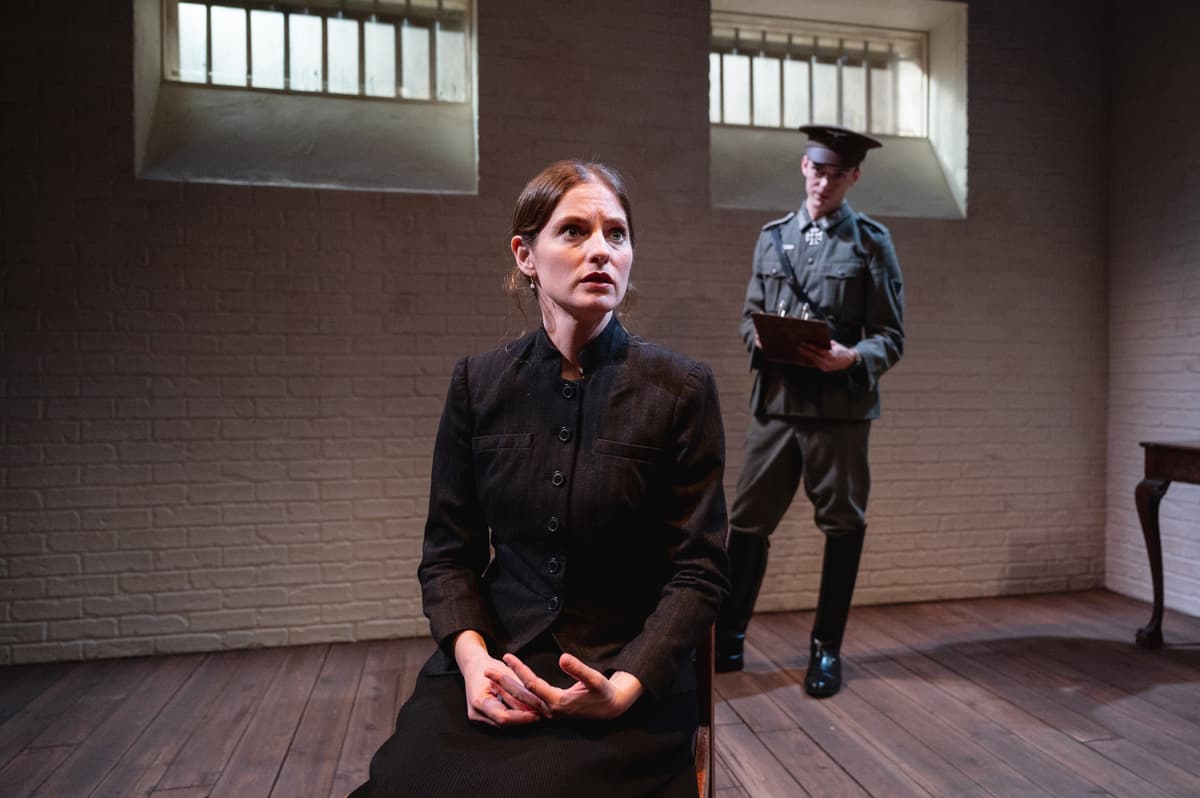A Portrait of Hannah Arendt as a Young Woman Shows the Philosopher Debating Zionism With the Gestapo
A new play argues that the author of ‘Eichmann in Jerusalem’ honed her thinking in a prison cell.

“Mrs. Stern Wanders the Prussian State Library” is a new play that argues that one of the 20th century’s most influential philosophers was schooled not only in Germany’s schools but also in its prisons. “Mrs. Stern” is the married name of the historian and philosopher Hannah Arendt, whose works on political theory are enjoying a resurgence. The production, at 59E59, is a spare one, but it opens up the tragedy and triumph of Jewish history.
Berlin in 1933 was a city in crisis that was about to plunge into the abyss. Arendt, though, was on her way up. Born in 1906 at Hanover, she grew up at Koeningsberg, and took to Marburg to pursue her studies and a romantic affair with the philosopher Martin Heidegger. He was the formidable author of “Being and Time” and soon was to become an enthusiastic Nazi. Arendt secured her dissertation — on love and St. Augustine.
For Arendt, thoughts of the Bishop of Hippo soon gave way to more pressing concerns. Backroom deals and street violence deliver Adolf Hitler the chancellorship. The Reichstag burns, and the Nazi vision for Germany and the Jews comes into focus with boycott laws and venomous rhetoric. As Weimar falls, Arendt moves in Zionist circles, despairs assimilation into Germany, and makes plans to speak at the Zionist Congress at Prague.
Arendt’s work on the 18th century Jewish salonnière Rahel Varnhagen — a remarkable figure in her own right — earned her access to the Prussian State Library, one of Europe’s most impressive. Arendt used that opportunity to research Nazi antisemitism, with an eye to sharing her findings with the world. Hitler, though, had already suspended civil liberties, and this project was illegal. Arendt was denounced and arrested.
“Mrs. Stern,” written by Jenny Lyn Bader and directed by Ari Laura Kreith, is set during the eight days that Arendt and her mother served in prison. Arendt is played by Ella Dershowitz, who captures the young scholar’s nervous incredulity. The assured public intellectual who would cast judgment in “Eichmann in Jerusalem” and “On the Origins of Totalitarianism” awaits decades in the future. The youthful “Mrs. Stern” is still a newcomer to horror.

Arendt, though, is fortunate in her jailer. Karl Frick (Brett Temple) has the polished boots of a Gestapo officer, but develops a soft spot for the hapless philosopher. Maybe such mercies were still possible in 1933. Their dialogue consists of Frick interrogating Arendt about her writing. Ms. Dershowitz ably plays her as a thinker in distress. Arendt claims that she was just researching recipes in the library, and that her mind was preoccupied by ancient Greek.
In interviews, though, Arendt describes herself as anything but naive. In 1964, she told the journalist Gunter Graus that she “had the intention to emigrate anyway. I was immediately of the opinion: Jews can’t stay. I had no intention of running around in Germany as a second-class citizen.” She expresses gratitude to Berlin’s Zionists for giving her the opportunity to work against the Nazis. Arendt would go first to Paris and then to New York.
Arendt also told Graus that Frick’s real-life equivalent was a “lovely guy” and that she “relied on this man who had arrested me — such an open, decent face.” In the play, Arendt pretends that all she knows “of the Zionists is their silly notions,” but her relationship to Jewish self-determination would be vexed. By rights she ought to have cheered the Jewish return to sovereignty and politics as a triumph of decolonization. For her, it was never that simple.
Ms. Dershowitz is in full command of Ms. Bader’s script, but the staging’s commitment to portraying Arendt as an ingénue underplays the extent to which the philosopher, even as a young woman, had already received a crash course in the high culture and rising darkness that obtained on the eve of the Third Reich. She had already been betrayed by Heidegger and been forced into the vortex of impossible choices that would strangle Europe’s Jews.
By the time Arendt was arrested, she had already concluded: “If one is attacked as a Jew one must defend oneself as a Jew. Not as a German, not as a world citizen.” She put that into practice at Paris, working for Youth Aliyah. She was arrested again, in 1940, detained at the Vélodrome d’Hiver, and sent to a concentration camp at Gurs. Her fame even then was enough to get her on an emigration list from France, whence she brought these demons to the New World.
This play could be a step to revisiting the furor that arose over Arendt’s loyalties to Jews and their state in the wake of “Eichmann in Jerusalem.” Arendt carried no brief for the Nazi bureaucrat, but she reserved criticism for the country that tried him and even for his victims. The sage Gershom Scholem accused her of lacking in ahavat yisrael, or love of the Jewish people. This play suggests that the chronicler of the bloody past might be defended — as a Jew.

